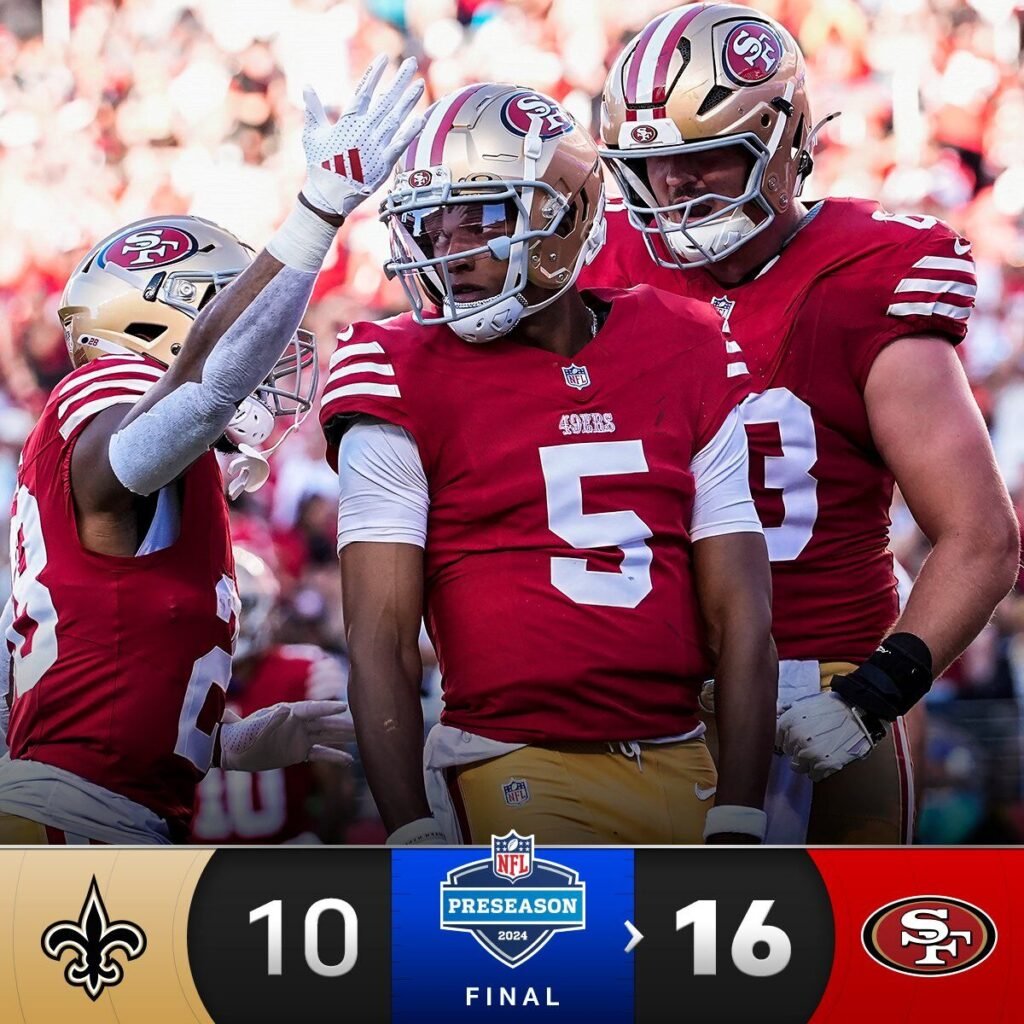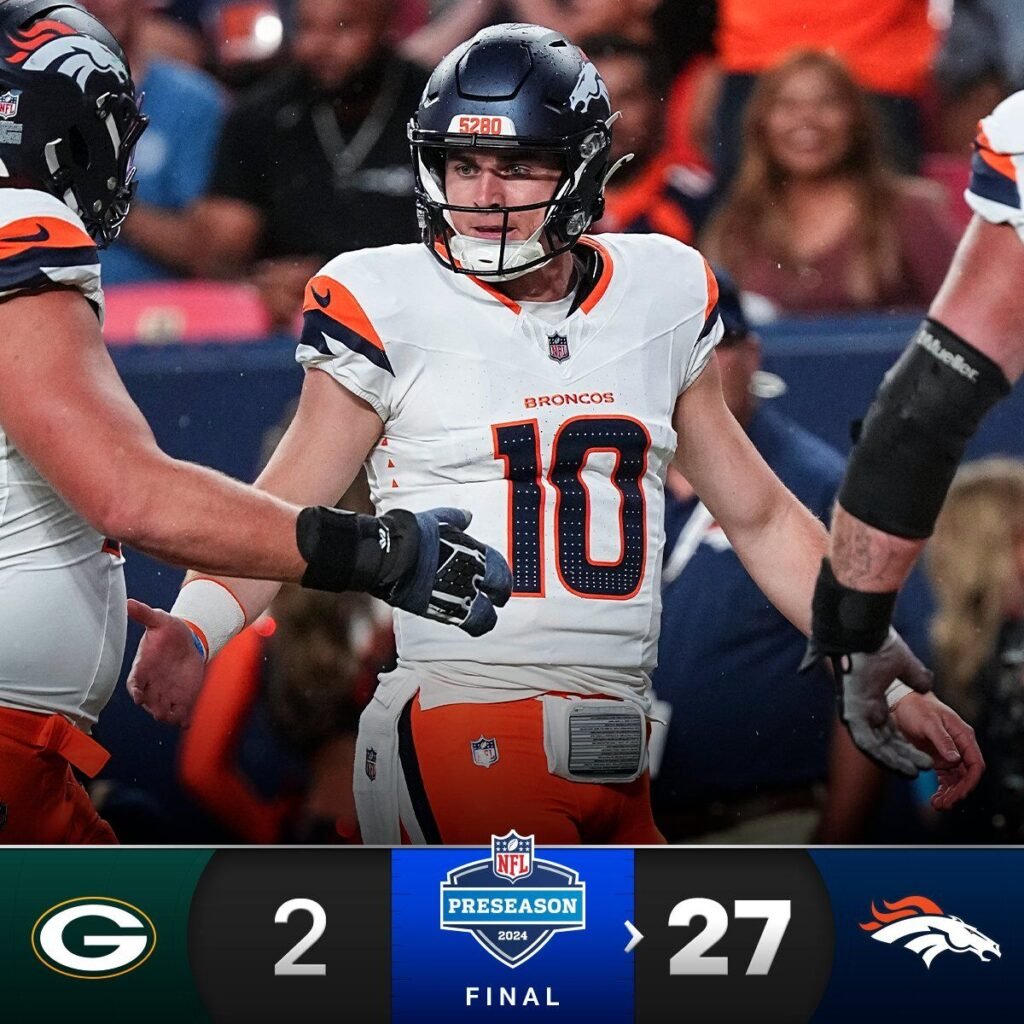Brock Purdy’s Preseason Start: A Decision The 49ers May Regret
- Leave a Comment
- James M
- August 19, 2024

Teams use the NFL preseason as a crucial time to assess their rosters, hone their tactics, and get ready for the demands of the regular season. It’s an opportunity for coaches to try out new lineups, evaluate the play of their younger players, and make sure that their main players are at peak performance. Teams can correct any holes or vulnerabilities during the preseason, which is a great time to test and refine game plans before the stakes are raised.
Brock Purdy, the quarterback for the San Francisco 49ers, made his first appearance since the team’s Super Bowl defeat by the Kansas City Chiefs on August 18, 2024. After a fantastic season that saw him named an MVP finalist, Purdy’s return to action against the New Orleans Saints was much anticipated. Purdy’s performance in this preseason game was eagerly monitored by fans and analysts alike because of his importance to the 49ers’ offense.
But there were questions after Purdy’s performance in the preseason opener. Purdy’s performance was subpar because of his disjointed offensive line and the absence of several of his main offensive weapons. There were more questions than answers in this game, especially when it came to the choice of playing Purdy in such difficult circumstances. Instead of helping him get over his rustiness, the move brought attention to some of the concerns associated with playing in the preseason.

Background
The final NFL season for Brock Purdy was nothing short of extraordinary. After suffering a string of injuries, Purdy took over as the San Francisco 49ers’ primary quarterback and quickly became an important member of the squad. He was a finalist for MVP because of his outstanding season-long play, which demonstrated his capacity to guide the 49ers through a difficult campaign. Purdy demonstrated his potential as a future star in the NFL by playing a key role in San Francisco’s pursuit of a Super Bowl and demonstrating his accuracy, decision-making, and composure under duress.
In the 49ers’ opening preseason encounter with the Tennessee Titans, backups Joshua Dobbs and Brandon Allen garnered most of the attention. In an attempt to assess their depth behind Purdy, the team played a lot of both quarterbacks. The coaching staff used the game to evaluate these quarterbacks’ performances and gauge their suitability for future regular season positions. Purdy’s decision to stay off the field in order to protect his health and reduce danger was made strategically with the goal of assessing these players in mind.
Nonetheless, there was a lot of excitement about Purdy’s comeback when the 49ers played the New Orleans Saints on August 18, 2024. It was Purdy’s first game after the club lost to the Kansas City Chiefs in the Super Bowl, therefore it was a big game for the individual as much as the team. Both fans and pundits were curious to see how Purdy would fare following a lengthy absence and whether he would return to his stellar play from the previous campaign.
The difficult conditions obscured Purdy’s play in the game, despite the excitement. Purdy’s comeback was far from ideal, with a makeshift offensive line and many of his best offensive weapons out of commission. There were concerns about the choice to start him in this situation, particularly considering the possibility of injury and the need to safeguard a valuable player who had already demonstrated his ability. This hypothetical situation paved the way for a more thorough analysis of whether the 49ers’ decision to play Purdy at this stage of the preseason was the right one.
NASTY NASTY PUMP FAKE…
— MLFootball (@_MLFootball) August 19, 2024
😳 pic.twitter.com/6i3oN9wy4W
The Matchup with the Saints
Brock Purdy’s performance in the preseason game against the New Orleans Saints was a far cry from his stellar play from the previous campaign. His meagre 11-yard completion percentage (2 of his 6 attempts) demonstrated the difficulties he encountered on the field. It was clear from the small sample size that Purdy was facing a number of obstacles that impeded his efficacy. His poor performance was not only the result of his own play; a number of outside variables also exacerbated his troubles.
The 49ers’ offensive line, which was without several important starters like center Spencer Buford, guard Aaron Banks, and left tackle Trent Williams, was in disarray for this game. The Saints’ imposing defensive front, which featured several reliable starters, proved too much for this patchwork offensive line to handle. Purdy had little time to think through his options or settle into a rhythm in the passing game because of the relentless pressure and multiple blows he took. Purdy’s problems worsened when the little protection caused him to be flushed out of the pocket and forced into rushed throws.
Purdy’s performance suffered greatly from a patchwork offensive line and a deficiency of important playmakers. The absence of offensive stars and the offensive line’s incapacity to offer sufficient protection brought Purdy a perfect storm of problems. His performance was subpar as a result of this circumstance, which also restricted his ability to establish connections with receivers and put him under continual pressure. Even though preseason games are frequently used to test new things and get ready for the regular season, this game’s severe circumstances made it clear why starting Purdy under such unfavorable circumstances could have been a bad idea.
Cam and Kittle ❤️ pic.twitter.com/B8boTFNifK
— NFL (@NFL) August 19, 2024
In the preseason game against the New Orleans Saints, Brock Purdy’s position carried a great deal of danger, which seemed to offset any possible upside. A makeshift offensive line and the absence of important offensive players made for difficult circumstances, thus Purdy’s decision to play put him at needless risk. There was a significant risk of injury, particularly with a player as important as Purdy. It is usually the intention to minimize risks and shield important players from possible injury during preseason games, which makes Purdy’s participation in these situations especially dubious.
It’s important to ask yourself if Purdy needed to play at all. The main purpose of preseason games is to assess depth and fine-tune tactics, not to put elite players to the test in challenging circumstances. Purdy isn’t really needed in this game against a strong defense and a weak supporting cast because he is the starting quarterback and doesn’t need to prove anything. It’s clear that it could have been wiser to keep Purdy sidelined and away from such needless risks given the chance of injury and diminished performance brought on by poor weather.
The reasoning behind coach Kyle Shanahan’s choice to play Purdy in this particular situation could be closely examined. Getting Purdy some game action to shake off any rust or evaluate his handling of pressure are two possible motivations. It’s arguable if this game was the appropriate time for such an approach, though, given the preseason offers little opportunity for meaningful performance review. It may be questioned if Shanahan overlooked the wider ramifications of playing a major player in these circumstances or if he was driven by the necessity for an expedient evaluation.
Both experts and fans will probably disagree on this choice and discuss it. It’s important to strike a balance between risk management and preparation throughout the preseason, and it looks like Purdy’s selection was a gamble that could have been averted. If the choice affects Purdy’s preparation and the team’s overall plan as the regular season draws near, Shanahan will need to respond to these worries and provide an explanation for his actions.

It’s imperative to save important players for the regular season, especially when they’ve proven their worth in preseason play and have little more to prove. The main goal for Brock Purdy, who had a tremendous season and was named an MVP finalist, should have been to make sure he was in top form going into the regular season. Preseason games should not be used to jeopardize the health of established players; rather, they should be used to assess depth and fine-tune plans. Given Purdy’s established role as a focal point of the 49ers’ attack, it would have been better to keep him out of a game with such unfavorable conditions in order to preserve his health for the crucial regular season.
Choosing to play Purdy in this situation had serious possible repercussions. The most obvious risk is probably that of injury because preseason games are known for being unpredictable and having a higher likelihood of accidents. Purdy’s injury might have ruined the 49ers’ hopes of winning the Super Bowl and ruined their plans for the regular season. Furthermore, a subpar showing in these circumstances might undermine Purdy’s confidence, which might have an effect on his performance in crucial games. For a quarterback, confidence is essential, and a poor preseason performance could negatively impact a player’s mentality.
It’s evident that many teams handle their great players more cautiously when comparing this scenario to that of other teams. Key players have frequently been rested during the preseason by teams like the Philadelphia Eagles and the Kansas City Chiefs, particularly in contests where the danger of injury outweighs the advantages of more playing time. They can keep their best players for the regular season thanks to this tactic, which also helps them stay healthy and ready. These strategies emphasize how prudent it is to reduce risk for important players who have previously shown they are valuable members of their teams.
The 49ers’ choice to start Purdy in a contest in which he encountered numerous obstacles seemed to depart from this more circumspect strategy. Preseason games provide an opportunity for assessment and preparation, but the health and preparedness of the team’s best players should always come first. Playing Purdy under these conditions carries some possible risks, which emphasizes how important it is to safeguard key players in order to preserve their health and confidence for the next regular season.
Conclusion:
It was needless and dangerous for Brock Purdy to play against the New Orleans Saints in the preseason. Because of the poor circumstances—a haphazard offensive line and a lack of essential offensive weapons—Purdy took unnecessary risks by playing. There were worries about the possibility of injury and the effect on his confidence, but the decision to play him was made despite his established standing and the lack of need for more evaluation. Preseason should ideally be used to evaluate depth and refine tactics rather than jeopardizing the health of a player who has already shown to be a valuable member of the club.
Luckily, once the regular season starts, preseason performances tend to disappear from memory. It seems unlikely that Purdy’s dismal showing against the Saints would overshadow his prior successes and the expectations around his role in the next year. The 49ers’ objectives and the enormous potential of their star quarterback will once again come into focus as they get ready for the regular season. It’s more likely that the preseason difficulties will be viewed as a brief setback than a long-term issue.
Ultimately, the decision to play key players like Purdy in the preseason highlights the broader issue of protecting valuable assets. The importance of safeguarding top players from unnecessary risks cannot be overstated. By prioritizing their health and readiness for the regular season, teams can ensure that their star players are prepared to perform at their best when the stakes are highest. This approach is crucial for long-term success, as maintaining the well-being of key players directly impacts a team’s ability to compete effectively throughout the season.
